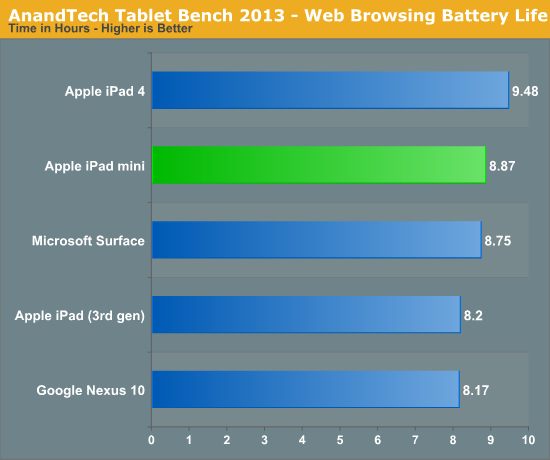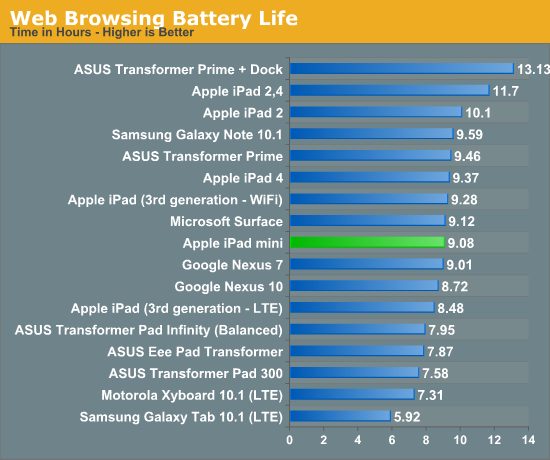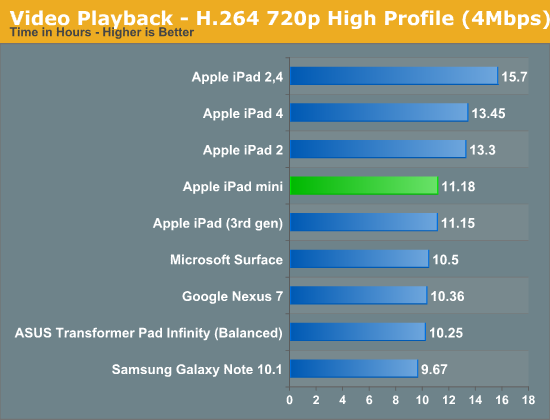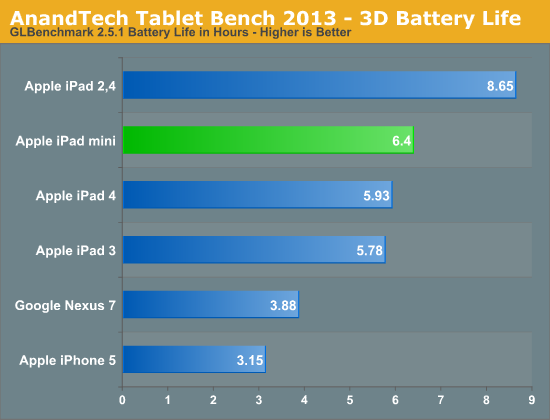iPad mini Review
by Anand Lal Shimpi & Vivek Gowri on November 20, 2012 6:10 PM ESTBattery Life and Charging
The iPad mini features an integrated 16.3Wh battery, easily smaller than the 43Wh unit in the iPad 3/4 but even smaller than the 25Wh used in the iPad 2. Given that the mini has roughly the same internals as the iPad 2,4, but with a substantially smaller battery, you can expect a corresponding decrease in battery life. The display is also smaller, which should reduce some of the power requirements a bit.
We've started running our new smartphone web browsing battery life test on tablets as well. If you missed its introduction in our iPhone 5 review, here's a bit about the new test:
We regularly load web pages at a fixed interval until the battery dies (all displays are calibrated to 200 nits as always). The differences between this test and our previous one boil down to the amount of network activity and CPU load.
On the network side, we've done a lot more to prevent aggressive browser caching of our web pages. Some caching is important otherwise you end up with a baseband/WiFi test, but it's clear what we had previously wasn't working. Brian made sure that despite the increased network load, the baseband/WiFi still have the opportunity to enter their idle states during the course of the benchmark.
We also increased CPU workload along two vectors: we decreased pause time between web page loads and we shifted to full desktop web pages, some of which are very js heavy. The end result is a CPU usage profile that mimics constant, heavy usage beyond just web browsing. Everything you do on your device ends up causing CPU usage peaks - opening applications, navigating around the OS and of course using apps themselves. Our 5th generation web browsing battery life test should map well to more types of mobile usage, not just idle content consumption of data from web pages.

The mini actually outlasts the 3rd gen iPad in our heaviest WiFi web browsing battery life test, but the 4th gen iPad's move to a 32nm SoC solves that problem. Under load however both the new iPad and the mini are fairly close in terms of battery life.
We haven't yet rerun our new test on all of the tablets, so we turn to our older 4th gen test to provide some additional reference points:

If we look back at our older test we get good perspective on everything. The iPad 2,4 still remains the king of single battery tablets, and the mini just barely makes it over 9 hours of use on a single charge. The mini still lasts long enough for it to be more of an all-day device than a notebook.
Our video playback test remains unchanged from previous tablet reviews. Here I'm playing a 4Mbps H.264 High Profile 720p rip I made of the Harry Potter 8 Blu-ray. The full movie plays through and is looped until the battery dies. Once again, the displays are calibrated to 200 nits:

Apple's video decode hardware implementation has always been stellar, as a result the mini manages to do very well here. At over 11 hours of video playback on a single charge, the mini is only bested by some of its larger iPad brethren. The iPad 2,4 remains insanely awesome here.
Our final cross-platform battery life test is the new GLBenchmark 2.5.1 Egypt HD test. Here we have a loop of the Egypt HD benchmark, capped to 30 fps, running on all of the devices with their screens calibrated to 200 nits.

I no longer have a 45nm iPad 2 so I don't have results for it here, but the combination of the small 1024 x 768 display and 32nm A5r2 silicon gives the mini better battery life than the iPads equipped with a Retina display. The iPad 2,4 continues to offer amazing battery life here.
The GLBench battery life test gives us a reasonable minimum for the iPad mini's battery life, with the video playback test giving us a good maximum. You can expect to see 6.4 - 11.2 hours out of a single charge from the mini.
The mini comes bundled with a 1A charger identical to what you get with an iPhone 5 or a 5th gen iPod Touch. Using the new Lightning connector it'll take about 4 hours to complete a charge on the iPad mini.










140 Comments
View All Comments
protomech - Tuesday, November 20, 2012 - link
Top of the summary gives it away:"In my first week with the iPad mini, it quickly became the iPad I actually wanted to carry around. The mini's form factor is really where all of the innovation is. It's thin, light and an almost perfect balance of functional screen size and portability. I really love this form factor."
By specs, the mini is unimpressive. It's using a SOC introduced in early 2011. We've been accustomed to high resolution mini-tablets from B&N, Amazon, Google, etc. It has less memory and costs significantly more (particularly for higher SKUs).
But, at least for the reviewer, the form factor trumps all these things, at least for purposes of a "carry computer". Thinner and lighter than the 7" tablet comparison, with significantly more usable display space (Android 4.x soft buttons do not help here) in nearly the same frontal area.
Would it be a better product if it sported an A6X SOC and a retina display? Certainly, on paper. It also likely would need a ~25 Wh battery and substantial increases in both weight and thickness .. same sort of changes from the iPad 2 to iPad 3.
iPad mini should have been introduced last year when the 32nm SOC was available IMO .. it would have provided a useful bifurcation vs the 3rd gen iPad's bulk gains, and perhaps we'd have an A6 SOC in the iPad mini today.
seanleeforever - Tuesday, November 20, 2012 - link
not sure how that quote answers Jorange's questions. but that's the internet nowadays.protomech - Tuesday, November 20, 2012 - link
Is it? It looks like it's a reply to Greg512. Certainly that's how I intended it.But, as you say, that's the internet nowadays.
ltcommanderdata - Tuesday, November 20, 2012 - link
I doubt Apple could have shipped a 32nm SoC last year in volume. The A5r2 was already the first shipping SoC produced on Samsung's 32nm process, ahead of Samsung's own designs, when it launched on the iPad2,4 in March 2012. And that was only used for low volume test production with the 45nm A5 iPad 2 continuing to be available. Apple prioritizing the iPhone 5 to receive a 32nm SoC first and waiting until now for high volume 32nm production to introduce 32nm iPad Mini, 5th gen iPod Touch, and iPad 4 makes sense.protomech - Tuesday, November 20, 2012 - link
Good point.. I thought it had shipped late last year.KoolAidMan1 - Wednesday, November 21, 2012 - link
"By specs, the mini is unimpressive."GPU performance is still surprisingly good, better than even the newest Android-running hardware. What is it with other companies not keeping up with Apple's older hardware?
Greg512 - Wednesday, November 21, 2012 - link
Yea, the GPU is good. But, for the price, the screen, CPU, and RAM are kinda poor. The Mini performs well now, but I question its long-term viability.marvdmartian - Wednesday, November 21, 2012 - link
Typical Apple product, that will sell like hotcakes: getting less, paying more, nothing new.drx11 - Sunday, November 25, 2012 - link
---------------------------------------------------------RE: Not a bad product by marvdmartian on Wednesday, November 21, 2012
Typical Apple product, that will sell like hotcakes: getting less, paying more, nothing new.
---------------------------------------------------------
Typical Fandroid, never sees the forest for the trees.
Apple is the best and has been so since 2007 - at building SoC.
Apple is the best at supporting its devices long term.
Now with iOS 6 - which is mostly supported (not all the features) for an old 3GS phone - you could argue you are getting less - maybe on the older devices (no Siri, Apple Maps is not as good as as Google Maps ... right now... etc..)
Still iOS 5 is very nice for older things and Android/Google/Moto/Samsung/HTC has rarely updated their "better" hardware at all ... you can blame that on the carriers all you want, but that is also what you are buying.
Buying more often, spending more time doing something that maybe should just work?
I know Google is trying (or starting to), but they really have almost no support for the majority (75%+ ) of the devices in their 'ecosystem'. What's the point of better hardware when it runs slower/worse from the start and never gets updated?
Alucard291 - Monday, November 26, 2012 - link
Did you have a joint before you wrote this drivel? Or does your mind work this bad drug free? ^^Good SoCs? Are you serious? Just because people work'd the shaft so hard when A6 came out doesn't mean that Cortex A9 based soc is viable coming into 2013.
Apple is currently behind the curve on both tech processes (28 nm vs 32 nm) and performance (cpu and ram speed but not gpu)
In case of ipad mini. You get less. (2 year old tech) you pay more (than any competition out there). But somehow we miss the forest for the trees?
Oh but it supports the amazing dated and feature free ios6! That's great. Except well.. (opinion incoming) I don't like ios. I find it restrictive and boring.
So your point is?